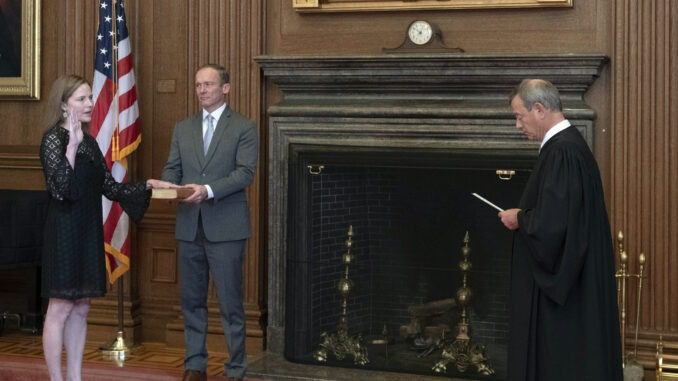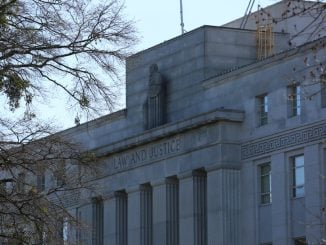
WASHINGTON, D.C. — Amy Coney Barrett was formally sworn in Tuesday as the Supreme Court’s ninth justice, her oath administered in private by Chief Justice John Roberts. Her first votes on the court could include two big topics affecting the man who appointed her.
The court is weighing a motion from President Donald Trump to prevent the Manhattan district attorney from acquiring his tax returns. It is also considering appeals from the Trump campaign and Republicans to prevent extending the deadline for receiving and counting absentee ballots in the battleground states of North Carolina and Pennsylvania.
Northeastern Pennsylvania’s Luzerne County filed legal papers at the court Tuesday arguing that Barrett should not take part in the Pennsylvania case. It’s not clear if she will vote in the pending cases, but she will make that call.
Barrett was confirmed Monday by the Senate in a 52-48 virtual party line vote.
“This is a momentous day for America,” Trump said at a primetime swearing-in event on the South Lawn at the White House. Justice Clarence Thomas administered the Constitutional Oath to Barrett before a crowd of about 200.
Barrett told those gathered that she believes “it is the job of a judge to resist her policy preferences.” She vowed, “I will do my job without any fear or favor.”
At 48, she’s the youngest justice since Clarence Thomas joined the court in 1991 at age 43.
“Voting to confirm this nominee should make every single senator proud,” said Senate Majority Leader Mitch McConnell, fending off “outlandish” criticism in a lengthy speech. During a rare weekend session he declared that Barrett’s opponents “won’t be able to do much about this for a long time to come.”
Most other Republicans facing tough races embraced the nominee who clerked for the late Scalia to bolster their standing with conservatives. Sen. Thom Tillis, R-N.C., said in a speech Monday that Barrett will “go down in history as one of the great justices.”
Other election-related issues are pending at the high court, which next week also will hear a clash of LGBTQ rights and religious freedoms. The fate of the Affordable Care Act is on the agenda on Nov. 10, and Trump himself last week reiterated his opposition to the Obama-era law. “I hope they end it,” he said in an interview with CBS News’ “60 Minutes.”
On Friday, Barrett, the most open opponent of abortion rights to join the court in decades, also could be called upon to weigh in on Mississippi’s 15-week abortion ban. The state is appealing lower court rulings invalidating the ban. Abortion opponents in Pittsburgh also are challenging a so-called bubble zone that prevents protesters from getting too close to abortion clinics.
The court put off acting on both cases before Barrett joined the court, without offering any explanation in the Mississippi case. It ordered Pittsburgh to file a response to the appeal filed by pro-life sidewalk counselors.
It’s not clear that the public will know how Barrett voted in the two abortion cases because the court typically doesn’t make the vote counts public when it is considering whether to grant full review to cases.
Barrett is joining the court at an unusual moment. The justices are meeting remotely by telephone because of the coronavirus pandemic, both for their private conferences and public argument sessions, at least through the end of 2020. The public can listen to the arguments as they take place, a change also resulting from the court’s response to the pandemic.
After her first private conference with her new colleagues on Friday, two weeks of arguments begin on Monday. In an institution that pays strict attention to seniority, Barrett will go last in the private and public sessions.
As she settles into her new office at the court, Barrett will be joined by four law clerks, usually recent law school graduates who have experience working for federal judges.
When the court reopens to the public and the justices return to the courtroom, Barrett is expected to assume several duties reserved for the court’s junior justice. She will be a member of the committee that oversees the court’s public cafeteria, and the person who takes notes and answers the door when someone knocks during the justices’ private conferences.



